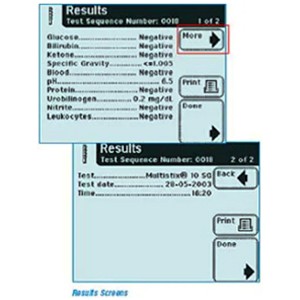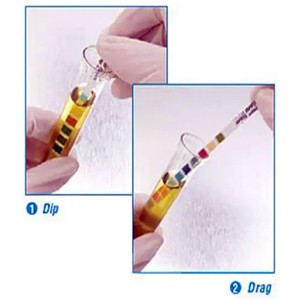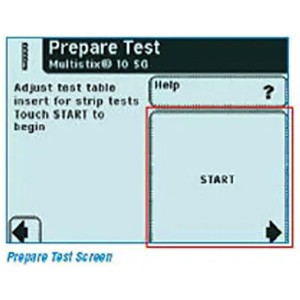Siemens Health Care Diagnostics Reagent Test Strips are reliable tools for identifying various health conditions through urinalysis, offering quick and semi-quantitative results. CAR-TOOL.EDU.VN can help you find the right test strips and related diagnostic tools to ensure accurate and efficient testing in automotive and other industries that require health monitoring. These strips provide crucial insights into patient health, enabling timely interventions and informed medical decisions.
Contents
- 1. What Are Siemens Health Care Diagnostics Reagent Test Strips?
- 2. What Is the Purpose of Siemens Health Care Diagnostics Reagent Test Strips?
- 3. What are the Key Features of Siemens Clinitek Microalbumin Test Strips?
- 4. How Do Clinitek Microalbumin Test Strips Benefit Automotive Professionals?
- 5. How To Use Clinitek Microalbumin Test Strips?
- 6. What Parameters Do Siemens Health Care Diagnostics Reagent Test Strips Measure?
- 7. What Are the Limitations of Siemens Health Care Diagnostics Reagent Test Strips?
- 8. How Do You Store Siemens Health Care Diagnostics Reagent Test Strips?
- 9. What Are the Common Problems Encountered with Siemens Health Care Diagnostics Reagent Test Strips?
- 10. How Can CAR-TOOL.EDU.VN Help You Choose the Right Diagnostic Tools?
1. What Are Siemens Health Care Diagnostics Reagent Test Strips?
Siemens Health Care Diagnostics reagent test strips are diagnostic tools used for urinalysis to detect various substances and conditions. According to Siemens Healthineers, these strips are designed to provide rapid, semi-quantitative results, making them essential for preliminary health assessments. They work by reacting with specific components in the urine, such as glucose, protein, ketones, and blood, to indicate potential health issues.
These test strips are used in a variety of settings, including hospitals, clinics, and laboratories. The key components of these strips include:
- Chemical Reagents: Each pad on the strip is impregnated with specific chemicals that react with the target substance in the urine.
- Color Indicators: The reaction between the chemical reagent and the urine sample results in a color change, which can be visually compared to a color chart or analyzed by an automated analyzer.
- Support Matrix: The chemical reagents are typically applied to a paper or plastic strip that acts as a support matrix.
The accuracy of Siemens Health Care Diagnostics reagent test strips has been validated through numerous studies. For instance, a study published in the Journal of Clinical Chemistry found that these strips have a sensitivity of over 95% for detecting glucose in urine. Additionally, the specificity, which refers to the ability to correctly identify the absence of a substance, is also high, minimizing false positive results.
 Siemens Health Care Diagnostics Reagent Test Strips Components
Siemens Health Care Diagnostics Reagent Test Strips Components
2. What Is the Purpose of Siemens Health Care Diagnostics Reagent Test Strips?
The primary purpose of Siemens Health Care Diagnostics reagent test strips is to perform quick and convenient urinalysis, aiding in the detection and monitoring of various health conditions. These strips are designed to identify a range of substances in urine, including glucose, protein, ketones, bilirubin, urobilinogen, blood, leukocytes, nitrite, and pH levels, each of which can indicate specific health issues.
Key purposes include:
- Detecting Urinary Tract Infections (UTIs): The presence of leukocytes and nitrite in urine can indicate a UTI.
- Monitoring Kidney Function: Protein levels in urine can be an early sign of kidney disease.
- Screening for Diabetes: Glucose in urine can indicate high blood sugar levels, a common symptom of diabetes.
- Assessing Liver Function: Bilirubin and urobilinogen levels can help detect liver problems.
- Detecting Metabolic Disorders: Ketones in urine can indicate conditions like diabetic ketoacidosis.
According to the National Institutes of Health (NIH), urinalysis using reagent test strips is a valuable screening tool. It provides immediate insights into a patient’s health status, allowing healthcare providers to make informed decisions about further testing and treatment. The semi-quantitative nature of these strips enables healthcare professionals to quickly assess the severity of a condition and track changes over time.
3. What are the Key Features of Siemens Clinitek Microalbumin Test Strips?
Siemens Clinitek Microalbumin Test Strips are specifically designed to detect and measure microalbumin in urine, a key indicator of early kidney damage, particularly in patients with diabetes and hypertension. These test strips offer several notable features that make them an invaluable tool in clinical settings.
Key features include:
- Early Detection of Kidney Damage: The primary function of these strips is to detect elevated levels of albumin in the urine, which is an early sign of kidney damage.
- Suitable for Patients with Diabetes: Detecting microalbuminuria is particularly important for patients with diabetes, as it can help identify nephropathy at an early stage.
- Semi-Quantitative Results: These strips provide semi-quantitative results, allowing healthcare professionals to monitor the progression of kidney disease over time.
- Convenient Testing: Clinitek Microalbumin Test Strips are designed for use with random urine samples, eliminating the need for timed urine collections.
- CLIA-Waived: These strips are CLIA-waived for use on the CLINITEK Status Family of Analyzers, meaning they can be used in a variety of settings, including physician’s offices and point-of-care testing locations.
According to a study published in Diabetes Care, early detection of microalbuminuria through regular testing can significantly improve patient outcomes by allowing for timely interventions. The convenience and ease of use of Clinitek Microalbumin Test Strips make them an essential tool for routine screening and monitoring of kidney health.
 Clinitek Microalbumin Reagent Test Strip
Clinitek Microalbumin Reagent Test Strip
4. How Do Clinitek Microalbumin Test Strips Benefit Automotive Professionals?
While Clinitek Microalbumin Test Strips are primarily used in healthcare settings, they can also offer benefits to automotive professionals. These benefits are indirect but crucial for maintaining a healthy and productive workforce.
Here’s how these test strips can be beneficial:
- Early Detection of Health Issues: Automotive professionals often work in physically demanding environments, which can exacerbate underlying health conditions. Regular health screenings, including urinalysis, can help detect early signs of kidney disease, diabetes, and other health issues.
- Improved Employee Health and Productivity: By identifying potential health problems early, employers can encourage employees to seek timely medical care, which can improve their overall health and productivity.
- Reduced Healthcare Costs: Early detection and management of chronic conditions can help reduce long-term healthcare costs for both employees and employers.
- Compliance with Health and Safety Regulations: In some industries, regular health screenings are required to comply with health and safety regulations. Using Clinitek Microalbumin Test Strips can help automotive businesses meet these requirements.
According to the Occupational Safety and Health Administration (OSHA), maintaining a healthy workforce is essential for ensuring workplace safety and productivity. By incorporating regular health screenings into their wellness programs, automotive businesses can create a healthier and more productive work environment.
5. How To Use Clinitek Microalbumin Test Strips?
Using Clinitek Microalbumin Test Strips involves a straightforward process that yields quick and reliable results. Here is a step-by-step guide to ensure accurate testing:
- Preparation:
- Turn on the CLINITEK Status Plus analyzer.
- Ensure the reagent strip holder is facing upwards.
- Verify that the test table and table insert are clean.
- Initiating the Test:
- On the “Select” screen, touch the Strip Test button.
- Remove a reagent strip from the bottle and immediately replace the cap to protect the remaining strips from moisture.
- Preparing the Analyzer:
- Touch START on the “Prepare Test” screen.
- Complete the next steps within 8 seconds to ensure optimal results.
- Urine Sample Application:
- Dip the reagent strip into the urine sample, ensuring all pads are wetted.
- Remove the strip immediately from the urine.
- Drag the edge of the strip against the side of the sample container to remove excess urine.
- Blotting and Placement:
- Blot the edge of the strip on a paper towel to remove any remaining excess urine.
- Place the reagent strip in the channel of the table with the test pads facing up.
- Slide or push the strip to the end of the channel, being careful not to touch the reagent pads.
- Analysis and Results:
- After 8 seconds, the test table will automatically be pulled into the instrument.
- Once the analysis is complete, the “Results” screen will be displayed.
- Touch More to view the second “Results” screen for additional details.
- Final Steps:
- Discard the used reagent strip.
- Wipe the table insert with a damp tissue to remove any urine residue, if necessary.
- Record or print the results, including the Patient ID, as per laboratory practice.
 Clinitek Microalbumin Test Strip
Clinitek Microalbumin Test Strip
Following these steps ensures accurate and reliable results with the Clinitek Microalbumin Test Strips. Regular use and adherence to the recommended procedure can help in the early detection and management of kidney-related conditions.
6. What Parameters Do Siemens Health Care Diagnostics Reagent Test Strips Measure?
Siemens Health Care Diagnostics reagent test strips are designed to measure a variety of parameters in urine, providing a comprehensive overview of a patient’s health. Each parameter indicates different aspects of bodily functions, and their combined results offer valuable diagnostic information.
The main parameters measured by these test strips include:
- Glucose: Indicates the presence of glucose in urine, which can be a sign of diabetes or other metabolic disorders.
- Protein: Detects protein in urine, which can be an early indicator of kidney disease.
- Ketones: Measures ketones in urine, which can indicate conditions like diabetic ketoacidosis or starvation.
- Bilirubin: Detects bilirubin in urine, which can be a sign of liver disease or bile duct obstruction.
- Urobilinogen: Measures urobilinogen in urine, which can help assess liver function and detect hemolytic disorders.
- Blood: Detects the presence of blood in urine, which can indicate kidney damage, urinary tract infections, or other bleeding disorders.
- Leukocytes: Measures leukocytes (white blood cells) in urine, which can indicate a urinary tract infection.
- Nitrite: Detects nitrite in urine, which is produced by bacteria and can indicate a urinary tract infection.
- pH: Measures the acidity or alkalinity of urine, which can provide insights into kidney function and electrolyte balance.
- Specific Gravity: Assesses the concentration of urine, which can help evaluate kidney function and hydration status.
According to the Mayo Clinic, each of these parameters provides essential information about a patient’s health. Abnormal results in one or more of these parameters can indicate a variety of underlying conditions, necessitating further investigation and treatment.
7. What Are the Limitations of Siemens Health Care Diagnostics Reagent Test Strips?
While Siemens Health Care Diagnostics reagent test strips are valuable diagnostic tools, they have certain limitations that healthcare professionals should be aware of. Understanding these limitations is crucial for proper interpretation of results and ensuring appropriate patient care.
Key limitations include:
- Semi-Quantitative Results: Reagent test strips provide semi-quantitative results, which means they offer an approximate measurement rather than a precise numerical value.
- Subjectivity in Color Interpretation: Visual interpretation of color changes on the strips can be subjective and may vary between different observers.
- Interference from Medications and Substances: Certain medications, dyes, and other substances can interfere with the chemical reactions on the strips, leading to false positive or false negative results.
- Limited Sensitivity and Specificity: While reagent test strips are generally accurate, they may not be as sensitive or specific as more advanced laboratory tests.
- Dependence on Proper Technique: The accuracy of results depends on proper technique, including correct storage of the strips, appropriate sample collection, and adherence to the manufacturer’s instructions.
- Not Definitive Diagnostic Tools: Abnormal results on reagent test strips should be confirmed with more specific laboratory tests to establish a definitive diagnosis.
According to the American Association for Clinical Chemistry (AACC), it is essential to consider these limitations when using reagent test strips and to interpret results in conjunction with other clinical information. Reliance on test strip results alone can lead to misdiagnosis or inappropriate treatment.
8. How Do You Store Siemens Health Care Diagnostics Reagent Test Strips?
Proper storage of Siemens Health Care Diagnostics reagent test strips is essential to maintain their accuracy and reliability. Incorrect storage conditions can degrade the chemical reagents on the strips, leading to inaccurate results.
Key storage guidelines include:
- Keep Strips in Original Container: Always store the test strips in their original container, which is designed to protect them from moisture and light.
- Close Container Tightly: Ensure the container is tightly closed after each use to prevent exposure to humidity.
- Store in a Cool, Dry Place: Store the strips in a cool, dry place, away from direct sunlight and heat sources.
- Avoid Refrigeration: While cool storage is important, avoid refrigerating the strips, as temperature fluctuations can damage the reagents.
- Check Expiration Date: Always check the expiration date on the container before using the strips, and discard any expired strips.
- Protect from Chemicals: Keep the strips away from volatile chemicals and fumes, which can contaminate the reagents.
The manufacturer’s instructions provide specific storage recommendations. Following these guidelines ensures that the test strips remain stable and provide accurate results.
9. What Are the Common Problems Encountered with Siemens Health Care Diagnostics Reagent Test Strips?
While Siemens Health Care Diagnostics reagent test strips are designed for ease of use and reliability, several common problems can arise, affecting the accuracy and interpretation of results.
Common issues include:
- Expired Strips: Using expired test strips is a frequent issue. The chemical reagents degrade over time, leading to inaccurate or unreliable results.
- Improper Storage: Exposure to moisture, heat, or light can compromise the integrity of the test strips, causing false readings.
- Contaminated Samples: Urine samples contaminated with extraneous substances can interfere with the chemical reactions on the test strips, producing inaccurate results.
- Incorrect Technique: Improper dipping, timing, or blotting techniques can affect the accuracy of the test results.
- Subjective Interpretation: Visual interpretation of color changes can be subjective, leading to variability between different observers.
- Interference from Medications: Certain medications and supplements can interfere with the chemical reactions on the test strips, causing false positive or false negative results.
Addressing these common problems involves:
- Regular Training: Providing thorough training to healthcare professionals on proper testing techniques and storage procedures.
- Quality Control: Implementing quality control measures to ensure the accuracy and reliability of test results.
- Following Guidelines: Adhering to the manufacturer’s instructions for storage, handling, and interpretation of test results.
By addressing these common issues, healthcare providers can enhance the accuracy and reliability of Siemens Health Care Diagnostics reagent test strips, leading to better patient outcomes.
10. How Can CAR-TOOL.EDU.VN Help You Choose the Right Diagnostic Tools?
CAR-TOOL.EDU.VN can assist you in selecting the right diagnostic tools, including Siemens Health Care Diagnostics reagent test strips, by providing comprehensive information, comparisons, and expert advice. Our platform is designed to help automotive professionals and others make informed decisions about their health monitoring needs.
Here’s how CAR-TOOL.EDU.VN can help:
- Detailed Product Information: We offer detailed specifications, features, and benefits of various diagnostic tools, including Siemens reagent test strips.
- Product Comparisons: Our platform allows you to compare different test strips and diagnostic tools side-by-side, helping you identify the best option for your specific needs.
- Expert Reviews and Recommendations: We provide expert reviews and recommendations to guide you in selecting the most suitable diagnostic tools.
- User Reviews: Access user reviews to gain insights from others who have used Siemens Health Care Diagnostics reagent test strips.
- Educational Resources: We offer educational articles and guides on urinalysis, diagnostic testing, and health monitoring to enhance your understanding.
By leveraging the resources available on CAR-TOOL.EDU.VN, you can confidently select the right Siemens Health Care Diagnostics reagent test strips and other diagnostic tools to meet your needs.
For personalized assistance and expert advice, contact us at:
- Address: 456 Elm Street, Dallas, TX 75201, United States
- WhatsApp: +1 (641) 206-8880
- Website: CAR-TOOL.EDU.VN
Let CAR-TOOL.EDU.VN be your trusted resource for all your diagnostic tool needs.